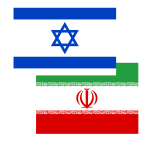Thursday
Aug122010
Iran-Israel-US: Goldberg Journalism "If You Build This War, It Will Come"
 Thursday, August 12, 2010 at 10:38
Thursday, August 12, 2010 at 10:38  I have read the "analysis" that may well dominate US-based chatter today: Jeffrey Goldberg's lengthy projection of high-level Israeli opinion on a aerial attack on Iran.
I have read the "analysis" that may well dominate US-based chatter today: Jeffrey Goldberg's lengthy projection of high-level Israeli opinion on a aerial attack on Iran.Here's Goldberg's hook-line:
What is [most] likely...is that one day next spring, the Israeli national-security adviser, Uzi Arad, and the Israeli defense minister, Ehud Barak, will simultaneously telephone their counterparts at the White House and the Pentagon, to inform them that their prime minister, Benjamin Netanyahu, has just ordered roughly one hundred F-15Es, F-16Is, F-16Cs, and other aircraft of the Israeli air force to fly east toward Iran --- possibly by crossing Saudi Arabia, possibly by threading the border between Syria and Turkey, and possibly by traveling directly through Iraq’s airspace, though it is crowded with American aircraft.
Let's call this for what it is. Jeffrey Goldberg is not functioning as an analyst here. He is not even carrying out the fundamental task of a reporter. He is serving as a spokesman for the Israeli Government in its attempt to put psychological pressure on Iran, to block any resumption of talks on uranium enrichment, and possibly to push Washington into acceptance of, if not support for, Israel's military action.
Goldberg's piece has no substance as a critique of the political, diplomatic, and military situation, for it is void of any information of --- as opposed to rhetoric about --- the state of Iran's nuclear programme and its international strategy. It is void of any information about Washington's perspective and approach, including the option --- very much "on the table", to use the cliche invoked for military action --- of discussions with Tehran.
"The Arabs" do appear for a couple of sentences, but only to have their perspectives simplified and twisted into support of an Israeli attack.
Goldberg's sole attention is to pass on and elevate the rhetoric of the Prime Minister, Benjamin Netanyahu, and his advisors. (The author claims authority from 40+ interviews with Israelis inside and outside the government, but they are merely murmurs amidst the loud declarations of Netanyahu and equally loud projection by Goldberg.)
It may well be that Israel has decided on military action by next spring, but we don't know that and neither does Goldberg. All we really know --- and I hope, for the sake of some integrity, so does he --- is that the Israeli leadership want him to think that.
And they want him to write that --- in an "intellectual" US periodical, where the New York-Washington political corridor will pick this us as received wisdom, rather than a slick propaganda operation.
I don't write this note as a rejection of the military option. However, if a writer is going to advocate that option, it should be done so openly and honestly, not disguised as "reportage". It should be done so on the basis of information from a range of sources, locations, and perspectives, not as a conduit for the manoeuvres of one actor in the political drama.
If Goldberg's piece receives undeserved attention as a considered definition of the state of the Iran-Israel-US relationship, then I will post a detailed dissection of its artifices and distortions.
But not now. Because for me, if one is concerned with news and, indeed, issues of justice and humanity, there are matters far more important --- yes, more important than boys-and-toys posturing on aerial warfare --- to attend to today, tomorrow, and the day after that.
tagged  Benjamin Netanyahu,
Benjamin Netanyahu,  Iran,
Iran,  Israel,
Israel,  Jeffrey Goldberg,
Jeffrey Goldberg,  The Atlantic,
The Atlantic,  airstrike,
airstrike,  war in
war in  Middle East & Iran
Middle East & Iran
 Benjamin Netanyahu,
Benjamin Netanyahu,  Iran,
Iran,  Israel,
Israel,  Jeffrey Goldberg,
Jeffrey Goldberg,  The Atlantic,
The Atlantic,  airstrike,
airstrike,  war in
war in  Middle East & Iran
Middle East & Iran 



